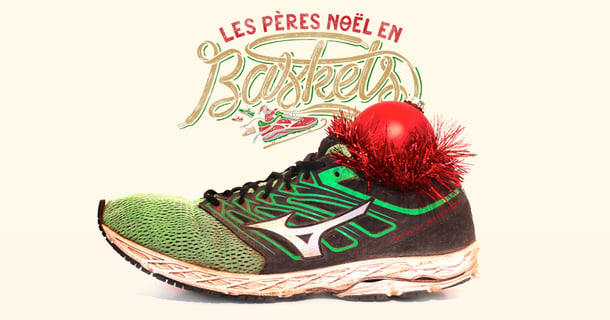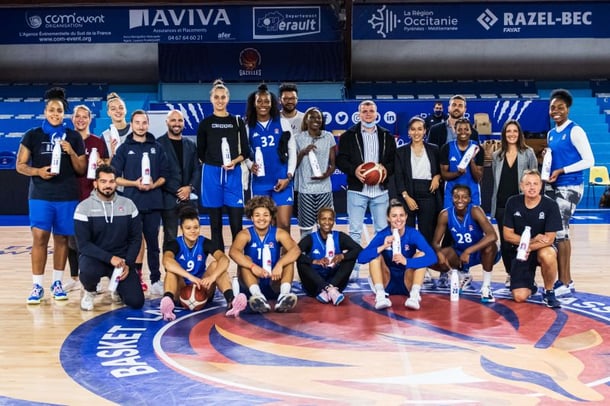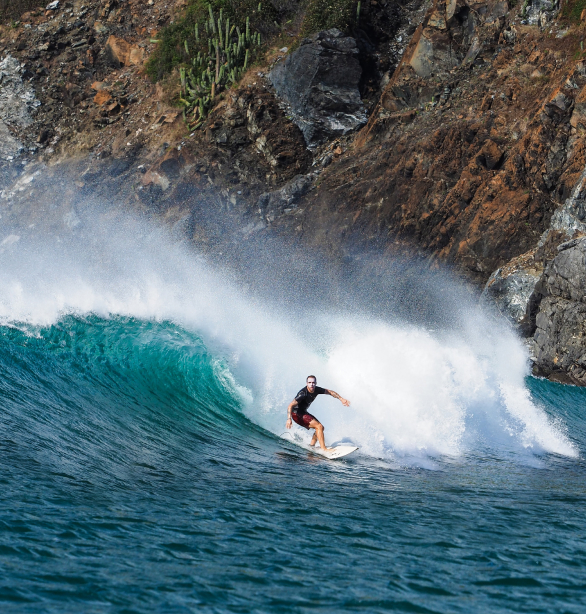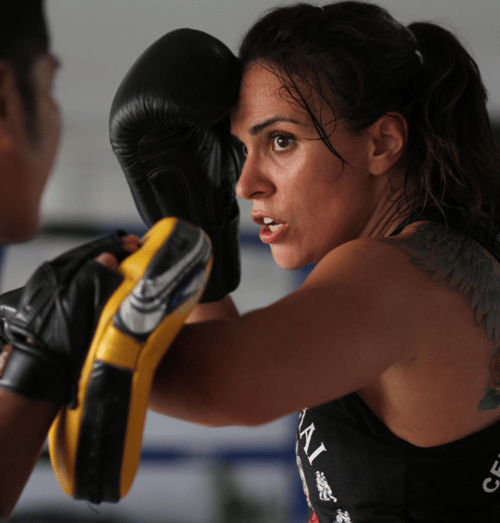We all realized this some time ago. Participants in the world of sport have been alerted by associations and civil society, and are more and more aware of the issue and understand the scope of climate change. The organizers of sports events, brands specializing in sportswear, institutions, and clubs all have a role in protecting the environment. And even a very important role... Because of the values associated with it and its wide exposure, the sport has an exceptional power of influence.
More and more ecological sports campaigns have been launched in the sector to avoid, limit or (at least) offset its impact. Here is our selection of 17 environmentally friendly initiatives that have impressed or appealed to us.
How sportswear brands are committing to the environment
Mizuno launches an environmentally responsible operation for Christmas

In December 2021, Mizuno got together with the French runners' community Running Heroes for the “Father Christmases in Trainers” campaign.
A challenge with a Christmas theme to encourage runners to denote old trainers lying under the bed or in a cupboard. Over 120 partner stores collected running shoes and handed them over to Run Collect, the association in charge of recycling or distributing them.
This environmentally friendly initiative is part of Mizuno's “Crew 21” sustainable development campaign, aiming at carbon neutrality by 2050.
Over 11,000 runners came forward and donated their trainers.
adidas partners with Parley for the Oceans
Since 2015, adidas has been working with the environmental NGO Parley for the Oceans to clean up the oceans and collect marine debris for recycling. In 2020, through this partnership, adidas manufactured 15 million pairs of sports shoes from plastic waste collected from the ocean and transformed by the NGO. The campaign shows the brand's determination to make 100% of its products from recycled polyester by 2024.
A goal that has attracted the most committed athletes.
The French surfer Justine Dupont has been sponsored by adidas since 2020. She uses equipment derived solely from recycled plastics. A meaningful initiative: the world vice-champion in big wave surfing is aware of the impact of her sport and is committed to an ecological approach and aims at carbon neutrality.
Decathlon x adidas: sports pitch with a double challenge

adidas also partnered with the major sports retailer Decathlon. In early 2022, the two brands launched the “Collectives” ecological initiative and collected over 25,000 pairs of shoes in one month. The next step: the shoe soles will be used to build a multisports pitch. The 100% recycled material will be turned into floor surfacing.
This environmentally responsible project is also inclusive.
Just 15% of users of public sports facilities are women. A figure that can be explained by the kind of facilities that are built: team sports (football, basketball), which are mainly played by men, generally take precedence. By building a multisports pitch oriented towards sports activities mainly played by women, Decathlon and adidas want to encourage women's sports.
Puma and its environmentally friendly studs
Sports brands are also making innovations in their products.
Vegan trainers or trainers made of recycled plastic are already on the shelves of many specialist brands. Le Coq Sportif is banking on plant leather made from grapes. Kipsta has worked with the expert in sustainable plastic solutions, Demgy Atlantique to produce a pair of recyclable studs.
Puma has joined the movement with its First Mile pack and the two pairs of studs made up of 21% and 42% recycled materials. The new pairs are made in partnership with the First Mile network, which recycles used plastics in Taiwan and Honduras. This is one more step towards the brand's goal of making 9 out of 10 of its products more sustainable by 2025.
What are the most environmentally friendly events?
The FIA and ecological innovation
Formula 1
At first sight, Formula 1 doesn't seem much like a sport respecting the planet (it isn't). But climate issues have caught up with the FIA, which has set itself an ambitious aim: Zero carbon emissions in 2030 for the Formula 1 championship.
The organization, teams, and racetracks themselves are all contributing. The French racetrack, Paul Ricard, for example, has been given a high level of FIA environmental certification due to its CSR strategy. The venue has reduced its water consumption by capturing rainwater, and its electricity use also fell after solar panels were installed. At Paul Ricard, 100% of waste generated by the races and the public is recycled. Plants and hedges have been planted to reduce engine noise and protect local animals. A bio-monitoring system has also been set up to measure air quality.
But to reach its aim of sustainable development, the FIA must tackle the issue of car pollution. And the institution is already experimenting with more environmentally friendly solutions in its lifesize laboratory: The Formula E championship.
Formula E
Formula E is the single-seater championship for electric cars launched in 2014. It highlights electric transport and sustainable development and aims to be a laboratory for testing and developing sustainable solutions. Technological and ecological innovations have also been launched. The cars run on biofuel made from vegetable oil for domestic use. The battery and tires are recycled after each race.
All the Formula E teams are also playing their part. They are encouraged to commit to a more ecological approach and to apply for environmental certification. The issue of transport is a big concern: most (75%) of the CO2 emissions in the sport are caused by it. Formula E and DHL have partnered to find more ecological solutions in logistics transport: an optimized race calendar, a multimodal approach giving preference to the railway and roads, racetracks in cities to limit transport for spectators, etc.
These efforts have borne fruit (Formula E is certified ISO 20121), prompting the FIA to pursue its strategy. In 2018, the institution launched a second environmentally responsible racing championship, the Extreme E, where sea freight is given precedence over air travel. This was how St Helena was born, a ship that has been converted into a floating ecological base.
The Internationaux de Strasbourg, the first environmentally responsible sports event in France
Since 2010, the WTA 250 women's tennis tournament in Strasbourg has reduced carbon emissions by 30% intending to achieve carbon neutrality. No fewer than 79 environmentally responsible actions have been undertaken to reach this result.
They include a partnership with BMW to make a fleet of electric or hybrid cars available to the teams and a partnership with the SNCF railway company to encourage sustainable transport among supporters. The organizers have also introduced a rigorous selection of restaurants so that 70% of the food and drink on offer is organic, local, and seasonal.
Lastly, since 2010, the tournament organizers have launched the New Balls campaign, using recycled tennis balls to make mats, play area surfaces, or landing pads for slides in parks. And to spur on the public, each visitor bringing in at least 12 old tennis balls will be given 4 official tennis balls used by players during the tournament. 24,000 tennis balls have already been collected during the campaign!
Objective carbon neutrality: ESL Gaming

The energy impact of the esport industry is among the very worst. The world consumption of players on computers and consoles is close to 75 TWh a year, equivalent to the output of 10 nuclear reactors.
ESL Gaming, the industry leader, is striving to bring about lasting changes in behavior. Since 2018, the organization has been tracking and calculating its CO2 emissions and was recently awarded certification from the UN in recognition of its carbon neutrality. ESL Gaming is working with the environmental NGO Planted on these projects. Planted helps them to offset emissions through reforestation and by funding innovative projects focused on green energy.
The ESL Flowe Championship in Italy was the first carbon-neutral esport tournament. The strategy was based on offsetting CO2 emissions: to do so, 80 trees were planted by the organizers.
Sports institutions' commitment to the environment
The World Surf League: surfing on the ecological wave
The World Surf League's commitment to the environment goes beyond collecting waste on beaches or initiatives to reduce the sport's carbon emissions. The goal of each WSL championship is to leave the spot in a better condition than it was before.
At the same time, the institution has set up the WSL Pure foundation to centralize its actions and raise the general public's awareness using original content. The "We Are One Ocean" campaign encourages surfers and surfing fans to commit to protecting the oceans and to call on world leaders to safeguard certain areas. In the One Ocean podcast, artists, athletes, activists, and teachers speak out to inform the general public and raise awareness.
The surfing community, led by the great names in the sport, such as Paige Alms and Conner Coffin, are working alongside the World Surf League to implement these initiatives.
The Spanish Olympic Committee: gold medal for sustainability
The Spanish Olympic Committee is actively committed to protecting the environment. As well as adopting environmentally responsible initiatives in daily life, such as stopping the use of plastic and recycling waste, the Spanish Olympic Committee has also forged partnerships to adopt environmentally friendly transport and sustainable premises.
The Spanish Olympic Committee is also encouraging its European peers to achieve the carbon neutrality goals set by the United Nations for 2050. Its second congress recently took place, focusing on sustainable development in the Olympic movement, with themes such as energy management and sustainable transport.
The NFL reduces its environmental footprint
In the United States, the NFL is more and more committed to an environmentally responsible approach to reduce its carbon footprint, and has set up the “NFL Green” programme.
With NFL Green, the organisation is working to reduce its environmental impact and partnering with sponsors, local associations and clubs. A wide range of sustainable development projects are supported by the programme. For the final in Miami in 2007 the NFL planted 3000 trees in Florida to offset the greenhouse gas emissions generated by the Super Bowl.
Clubs are following suit and making use of all their imagination to raise awareness among American football fans. First of all, by renovating and adapting stadiums to make them more environmentally friendly. Like the new home of the San Francisco 49ers. The Levi’s Stadium is already fitted with solar panels and will soon be given a green roof. For the Philadelphia Eagles, the communications team is teeming with ideas to encourage fans to recycle. With success: 99% of the waste collected during the matches is recycled.
Clubs working for sustainable development
Aviron Bayonnais committed to the future
The professional rugby club from the Basque country recently became the first professional French club with a mission. In practical terms, the club wants to strengthen its commitments and lastingly incorporate social and environmental issues in its strategy.
A few years back, the club introduced a CSR policy in favour of the environment. In all, €300,000 has already been invested, and the club is continuing to carry out environmentally responsible initiatives. Two years ago, club supporters chose to donate their ecocup deposits to fund tree-planting in the region. Recently, Aviron Bayonnais organised a collection of waste on the banks of the River Nive with its partners Suez as part of World Clean Up Day. A whole club and everyone involved in it have adopted this new outlook.
Les initiatives écologiques des Portland Trail Blazers
Since 2005, the Portland Trail Blazers have been working to reduce their carbon footprint. The club's arena, the MODA Center, was the first to be given LEED O+M (v4.1) platinum certification, awarded to ecological buildings in the United States.
At the same time, the club has set itself the goal of achieving zero waste by 2025 and is already recycling its team shirts into bags or ties. Also by 2025, the Trails Blazers want to reduce their consumption of water by 10% and of energy by 25% to considerably decrease their carbon footprint.
In order to raise awareness among the fans, the basketball club launched the LIVE Greener Challenge in 2019. By adopting environmentally responsible measures on a daily basis for 1 month, the 1097 participants were able to win points for their team. An effective way of promoting actions in favour of the environment.
The Basket Lattes-Montpellier Association says no to plastic bottles
The French women's basketball club reckons that its professional players were drinking no fewer than 6,000 bottles each season! To remedy the situation, the club decided to make customised isothermal flasks for each player with their name and number.

The initiative also aimed to raise awareness among the fans. The players are the ambassadors of an environmentally responsible project and are passing on good practices to fans, especially the younger ones. The flasks are also on sale at the club's official shop to encourage as many supporters as possible to choose flasks over plastic bottles.
Paris Volley, specialists in CSR
The Paris Volley volleyball club has developed a programme aimed to promote an ecological policy called Envolley Verte, based around several themes:
- Transport: none of the players has a company car, the club has halved the number of plane flights and the supporters who come to matches by public transport win rewards
- Restaurants: the club wants to achieve zero waste and gives preference to organic products using short food supply chains.
- Raising public awareness: the club has introduced recycling on a daily basis and set up environmentally responsible activities to change attitudes and adopt positive behaviour, such as recycling and waste-sorting workshops.
The Parisian volleyball club has also launched a brand, Match for Green, aiming to bring together everyone involved in the sport. To date, 50 clubs have taken part in CSR courses to raise awareness, train and mobilise their staff.
FC Forest Green, the world's greenest club
Pioneers in more sustainable football, FC Forest Green is the first carbon-neutral football club (certified in 2018).
Since 2011, the club's organic and vegan pitch is maintained with manure and seaweed certified free of chemical products. It is watered with rainwater collected by the club.
Their current home ground, the New Lawn Stadium, is now equipped with 180 solar panels meeting 20% of the stadium's needs with the rest coming from wind turbines. Their future stadium, Eco Park, will also be powered by green energy. It will be located in a natural setting and will mainly be made from wood, a natural material with the lowest carbon footprint. In the ground, only vegan dishes are made for supporters and players.
The Montreal Canadiens: the goal is green
Ice hockey is thought to be one of the sports causing the most pollution. And yet, the people involved are striving for better carbon accounting results.
This is the case of the Montreal Canadiens, who in 2007 launched their programme The Goal is Green with the aim of reducing the environmental footprint of the club and its arena, the Centre Bell. There are four aspects to this environmentally friendly initiative:
- biodegradation: 95% of the utensils at the Centre Bell are biodegradable.
- composting and recycling: 90% of old seating is recycled.
- energy savings: a reduction of 65% in energy consumption.
- transport: a preference for underground parking.
The club has also launched the Plant a Stick programme, with 10 trees planted whenever a hockey stick is broken. No fewer than 2760 trees were planted in a single season (2018-2019).
Listing all the environmentally responsible initiatives in the world of sport would be impossible. It shows the shared determination of everyone involved in sport to act in favour of the environment and to raise awareness among fans. In the coming years, more and more clubs, organisations and sportswear brands will have to aim for carbon neutrality, to expand their action in favour of the environment and to apply for certification to show the sustainability of their institution.




